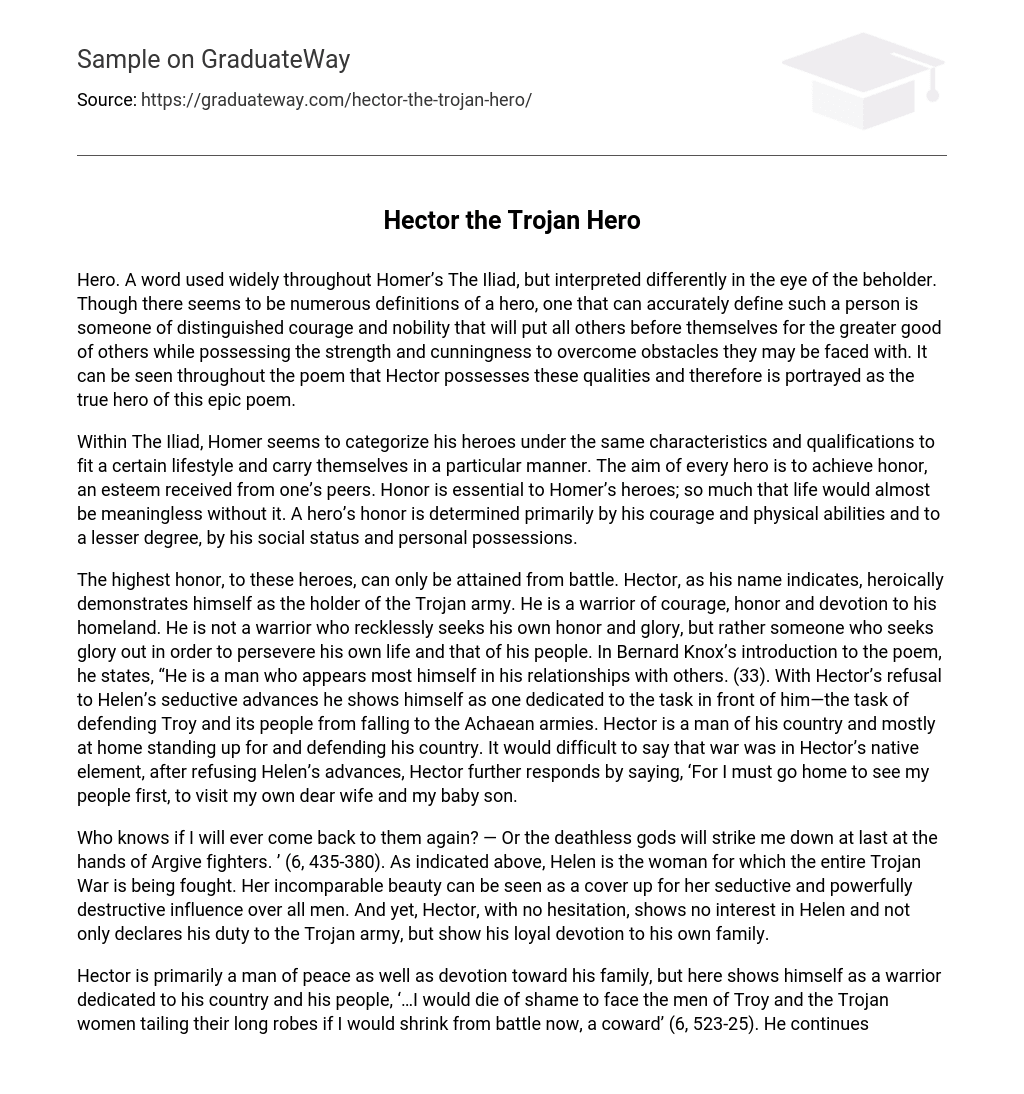Hero. A word used widely throughout Homer’s The Iliad, but interpreted differently in the eye of the beholder. Though there seems to be numerous definitions of a hero, one that can accurately define such a person is someone of distinguished courage and nobility that will put all others before themselves for the greater good of others while possessing the strength and cunningness to overcome obstacles they may be faced with. It can be seen throughout the poem that Hector possesses these qualities and therefore is portrayed as the true hero of this epic poem.
Within The Iliad, Homer seems to categorize his heroes under the same characteristics and qualifications to fit a certain lifestyle and carry themselves in a particular manner. The aim of every hero is to achieve honor, an esteem received from one’s peers. Honor is essential to Homer’s heroes; so much that life would almost be meaningless without it. A hero’s honor is determined primarily by his courage and physical abilities and to a lesser degree, by his social status and personal possessions.
The highest honor, to these heroes, can only be attained from battle. Hector, as his name indicates, heroically demonstrates himself as the holder of the Trojan army. He is a warrior of courage, honor and devotion to his homeland. He is not a warrior who recklessly seeks his own honor and glory, but rather someone who seeks glory out in order to persevere his own life and that of his people. In Bernard Knox’s introduction to the poem, he states, “He is a man who appears most himself in his relationships with others. (33). With Hector’s refusal to Helen’s seductive advances he shows himself as one dedicated to the task in front of him—the task of defending Troy and its people from falling to the Achaean armies. Hector is a man of his country and mostly at home standing up for and defending his country. It would difficult to say that war was in Hector’s native element, after refusing Helen’s advances, Hector further responds by saying, ‘For I must go home to see my people first, to visit my own dear wife and my baby son.
Who knows if I will ever come back to them again? — Or the deathless gods will strike me down at last at the hands of Argive fighters. ’ (6, 435-380). As indicated above, Helen is the woman for which the entire Trojan War is being fought. Her incomparable beauty can be seen as a cover up for her seductive and powerfully destructive influence over all men. And yet, Hector, with no hesitation, shows no interest in Helen and not only declares his duty to the Trojan army, but show his loyal devotion to his own family.
Hector is primarily a man of peace as well as devotion toward his family, but here shows himself as a warrior dedicated to his country and his people, ‘…I would die of shame to face the men of Troy and the Trojan women tailing their long robes if I would shrink from battle now, a coward’ (6, 523-25). He continues by further realizing the inevitability of Troy’s fall, as he acknowledges it will one day come. But as soon as one would believe he loves his country more than his family, he continues saying to his wife, Andromache, ‘… t is less the pain of the Trojans still to come …in all their numbers, all their gallant courage, may tumble in the dust, crushed by enemies— That is nothing, nothing besides your agony …wrenching away your day of light and freedom! ’ (6, 533-41). It seems that Hector fights in order to protect his family, which shows Hector as one who does not find his identity in battle. This proves to show that while Hector is portrayed as the hero of Troy, there are many more aspects to being a hero than fighting in battle to gain respect and honor.
It is the ones who protect and care for their families that are the true heroes. Hector demonstrates himself as a brave, authoritative, courageous and formidable warrior, who will fight to the death for the sake of his people. And yet, also as someone who does not find his glory solely in the gruesome realities of war. Hector is willing to lay aside his own potential glory so that the war may come to an end. In the end, Hector’s fate is seen as he falls to the man who is most unlike himself—Achilles. From the beginning,
Achilles is a man of complete rage and anger, as seen in his refusal to battle the Achaeans due to a disagreement with Agamemnon. Although Hector is one whose native element is not found in war, but in peace and not his own personal glory, Achilles identity is essentially found in his victory in war. In the end, it must be remembered as Knox has so eloquently put it, that “The Iliad is a poem that lives and moves and has its being in war, in that world of organized violence in which man justifies is existence most clearly by killing others” (35).
Therefore, when Hector becomes the object of Achilles rage, his death becomes inevitable. However, this reality should not undermine the fact that in Hector we see “not only the devotion of a warrior who does his duty and fights for his people, even though he knows they are doomed,” (34), but also someone who is a great husband and father, who places family above himself. The greatness of Hector can be seen in the overall unity of his character. Hector is the only character in The Iliad that, in the face of immense adversity, shows himself as a complete man. A true hero.





